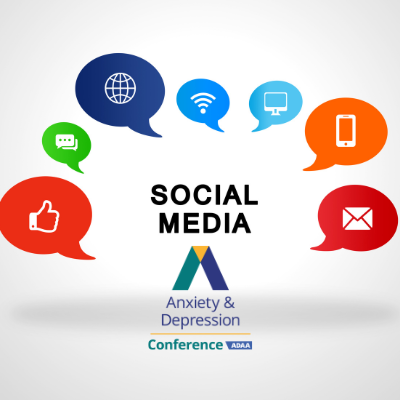Join the Conversation: The ADAA Conference, Social Media and You!
Join the Conversation: The ADAA Conference, Social Media and You!

ADAA’s conferences are incredible, offering unparalleled learning, networking, and engagement opportunities. However, for many attendees – both new and seasoned – the constant hustle can be overwhelming. As professionals, we want to gain the most we can from attending conferences, but the most effective way to do that can be elusive. One terrific tip we can take from mindfulness is to be present. Engaging in sessions and casual conversations can set off our minds about how we can take this information and best utilize it. Still, the intensity of going nonstop for three days can leave our minds exhausted. Afterwards we might wonder, what details did I love but not retain in the whirlwind of the conference?
But utilizing social media is a fantastic avenue for improving an attendee’s present experience at ADAA. Really? How?
- Missed gems. We can’t attend every session, but checking out what others post and tag #ADAA2024 can pique interest and influence what sessions people want to attend for the rest of the conference.
- Engagement. Our community is strong, funny, and supportive, and participating in back-and-forth interactions on social media can build relationships with people with whom a participant might not otherwise interact with. They can also provide context and answer questions.
- Promotion. Presenters want session attendees to benefit from their presentations, but the only way for that to happen is if people show up. Getting people excited for a talk by promoting it online and dropping hints about what will be discussed can build curiosity and increase attendance.
- Retention. It’s no secret that when a person is hit with a lot of information in a short time it can be difficult to grasp and embrace it all. By posting nuggets on social media, attendees can return post-conference as a reminder of what to read, follow up on, or learn more about.
- Entertainment. People new to the field (or just to conferences) might not appreciate how much fun conferences can be. Posting humorous pictures and comments can lead to laughter and engagement with other conference attendees. Don’t believe me? Search #ADAA2021Virtual on Twitter and check out the posted photos, including @ocdbaltimore with chopsticks in his mouth, @ahbettis curled up with her dogs, and @AmaralLavoie’s “very rude” cat who slept through the keynote.
If social media seems foreign, consider just searching #ADAA2024 to see what others are up to. This offers opportunities to be part of conference goings-on even when not present at the moment it happened. For those who’d like to take it a step further, consider posting a photo or two when engaged in a conference with friends and colleagues we haven’t seen in person in three years! These are wonderful moments to hold dear, and social media can allow that excitement to continue beyond the conference. For the bold among us, enjoy posting, replying, and searching on social media. Just don’t forget to enjoy the in-person experience more than the social-media one.












